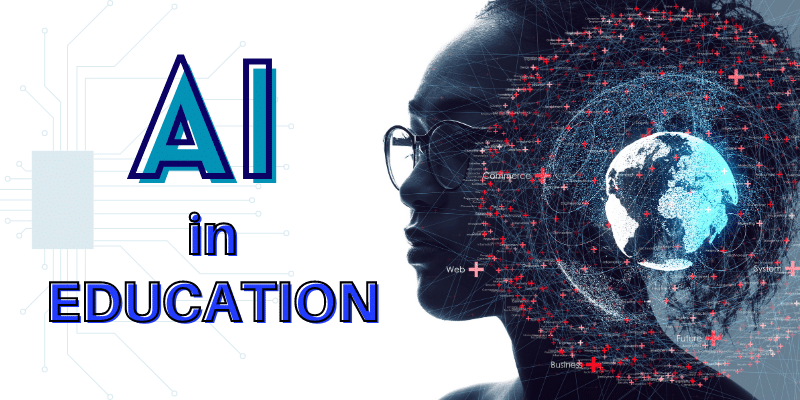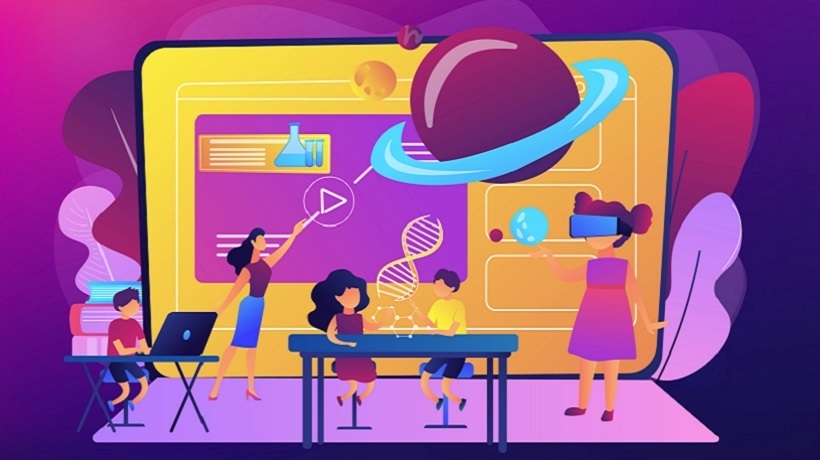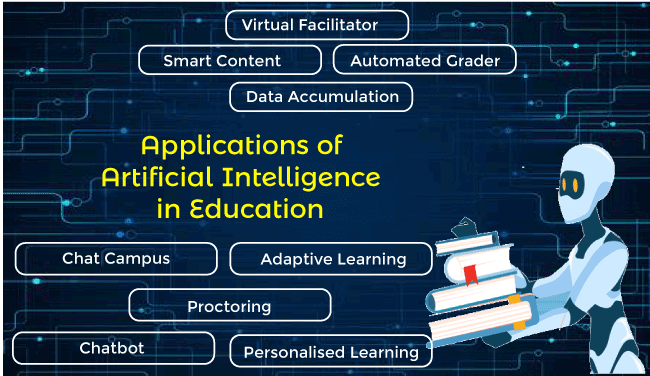


The Role of AI in Personalized Learning
As we know, artificial intelligence (AI) is revolutionizing the world. Education is no exception. AI in the classroom has the power to alter how students learn and how teachers impart knowledge. AI techniques and technology make it possible to customize learning and assessments, improving the effectiveness and efficiency of instruction. AI has the ability to offer students more effective and engaging learning opportunities that are tailored to their particular need.
AI is crucial to educating students for the opportunities and challenges of the future in a world that is changing quickly. AI enables instructors to provide new learning opportunities, attend to the varied learning needs of students, and assess student progress. The usage of AI in classrooms is anticipated to grow over time because of the technology’s enormous potential in education.
The purpose of this article is to examine the impact of AI on education, including potential benefits and challenges. This article discusses how AI can personalize learning and improve the accuracy and effectiveness of assessments, AI challenges and concerns in education, the importance of teacher and parent education on AI and the future of AI in education.
The role of AI in personalized learning
A teaching approach called “individualized learning” adjusts the educational process to fit the unique requirements, interests, and skills of each student. Individualized learning is widely acknowledged to be advantageous for students, and research demonstrates that it improves academic progress, motivation, and engagement. However, educators may have significant difficulties putting individualized learning into practice in traditional classrooms. Here is where technologies with AI-powered tailored learning come into play.
AI facilitates personalized learning by enabling teachers to analyze student progress and adjust curricula accordingly to provide personalized instruction. AI-powered tools, such as adaptive learning platforms and intelligent tutors, are designed to personalize each student’s learning experience.
Adaptive learning platforms are one of the most popular types of AI-powered tools for personalizing learning. These platforms use machine learning algorithms to analyze student data such as assessment scores, learning progress, and behavioral patterns. Algorithms then use this information to provide students with personalized content such as readings, quizzes, and videos based on their learning level and interests. With this approach, every learner can obtain the appropriate instructional materials and advance at their own pace. Smart tutors are a different class of AI-powered technology that provides a personalized learning environment. These applications use machine learning and natural language processing strategies to provide students with feedback and guidance on their learning progress. Smart Tutors can respond to inquiries, offer clarifications, and offer comments on tasks and tests. Particularly helpful in disciplines where one-on-one training is challenging.
For students, personalized learning offers several benefits. According to specific studies, individualized learning results in a 30% boost in learning outcomes, which shows that it benefits student performance. Additionally, individualized instruction can boost student motivation and engagement. Individualized learning can also increase student engagement and motivation. Students are more interested in learning when they feel their individual needs are being met. In addition, individualized learning helps develop critical thinking and problem-solving skills as students are encouraged to take more responsibility for their own learning.

The usefulness of AI-based customized learning has been demonstrated in numerous research. According to a 2018 Rand Corporation study, individualized learning supported by AI improves students’ academic performance. According to research, students who utilize personalized learning tools do better on exams than their non-using peers. The Center for Educational Development discovered in another study that individualized, AI-driven learning increases students’ comprehension of math topics.
Importantly, using AI-powered tools to personalize learning is not without its challenges. One of the biggest concerns is potential bias in AI algorithms. It is possible for biases and inequities to unintentionally persist in algorithms if they are not correctly designed or instructed. Another issue is that students can lose the ability to learn independently if they rely too much on the AI-powered tools.
Despite these difficulties, educators should consider personalized learning enabled by AI because of its potential advantages. Teachers may give students a more interesting and productive learning experience by giving them individualized teaching and feedback. Furthermore, as AI technology develops, individualized learning tools will probably become more advanced and efficient.
The Impact of AI on Assessment
As the use of AI in education becomes more widespread, it will not only revolutionize personalized learning, but also the way assessments are designed and administered. AI-powered review tools are game changers by improving the accuracy and efficiency of reviews, making ratings and reviews more objective and trustworthy.
An example of AI-based assessment is automatic grading, which uses machine learning algorithms to grade assignments and provide immediate feedback to students. This not only saves teachers time, but the AI can also identify areas where students need improvement, allowing students to give more detailed feedback.
Another example of AI-based review is plagiarism detection. It uses natural language processing to compare student submissions with its database of previous submissions and online sources. This ensures that student work is original and gives educators confidence in the authenticity of student work.
One of the main benefits of AI-based assessment is that it allows teachers to focus on other important tasks. Additionally, these ratings are more objective as they are not subject to the same biases and subjectivity as human reviewers. This can lead to more accurate and reliable assessments that more accurately reflect student understanding and progress. Studies show that AI-based assessments are just as accurate and reliable as human grading. For example, a study conducted by the Educational Testing Service found that automated essay grading systems produce results comparable to those achieved by graders. Another study conducted by the University of Georgia showed that an automated grading system was able to accurately score written questions on biology exams.
While AI-based assessment has many advantages, it is not without its limitations. Some educators worry that using AI-powered assessments will undermine critical thinking skills and creativity. Additionally, there are concerns about potential biases in AI-powered assessments, especially if the algorithms used are not properly developed and tested. To address these concerns, it is important to develop AI-powered assessment tools based on transparent and fair algorithms. Additionally, it is important to ensure that educators are appropriately trained to use these tools and understand their potential limitations and biases.
The Challenges of AI in Education
Integrating AI into education might create difficulties and problems, just like any other technology development. The possibility of ethical problems and bias in AI algorithms utilized in the educational system is one of the most significant worries. This is particularly valid when AI algorithms are applied to judgments that have an immediate impact on students, such autonomous grading or admissions decisions.
AI-based evaluation methods have occasionally been demonstrated to be harmful to particular student groups. For instance, a study conducted by academics at the University of California, Berkeley discovered that an automated grading system powered by AI is prejudiced towards students of African descent. Essays written by these groups were found to receive lower grades from the system, notwithstanding their content.
Even when the content of the essays was identical to that produced by white or male students, it was discovered that the system assigned lower grades to essays submitted by these groups.
The possibility for AI to displace human teachers is another issue. Although individualized learning experiences offered by AI have the potential to change education, there are worries that it may eventually take the position of teachers in the classroom. But it’s crucial to remember that AI can never fully replace the value of human engagement and participation in the learning process.
It is important for educators and policymakers to ensure the ethical and responsible use of AI in education. This means ensuring that AI algorithms are designed to be transparent, explainable, and unbiased. It also means looking at the potential unintended consequences of integrating AI into education systems and trying to proactively address them.

To address these concerns, there have been calls for increased regulation and oversight of AI in education. For example, the European Union’s General Data Protection Regulation (GDPR) includes provisions to regulate the use of AI algorithms and ensure transparency and accountability in their use. Similarly, the U.S. Department of Education has issued guidance on the ethical use of AI in education, emphasizing the importance of fairness, transparency, and accountability in the design and implementation of educational programs. education program. AI algorithms in education system. Overall, it is important for educators, policymakers, and other stakeholders to consider the potential issues and ethical concerns associated with the use of AI in education. By addressing these issues proactively and responsibly, we can ensure that AI is used to its full potential to revolutionize the way we teach and learn, while ensuring that it used in a fair, transparent and ethical manner.
The Impact of AI on Critical Thinking Skills Development
As the world becomes more complex, it becomes even more important to develop critical thinking in students. Critical thinking is the ability to analyze information, evaluate arguments, and draw conclusions based on evidence. It is an important skill for success in the 21st century.
AI is changing the way critical thinking skills are developed and assessed in the classroom. There are many AI-powered tools to help develop and evaluate critical thinking skills. An example of an AI-powered tool for developing critical thinking skills is argument mapping software. This software allows students to visualize the structure of their argument and see how the premises support their conclusion. Using argument mapping software allows students to better understand how arguments are constructed and evaluated.
Smart writing assistants are another example of AI-powered tools to develop critical thinking skills. These tools use natural language processing algorithms to help students improve the clarity and consistency of writing. By providing feedback on grammar, syntax, and structure, these tools help students develop the critical thinking skills needed to communicate effectively.
AI is also changing the way we assess critical thinking. For example, automated essay grading software uses natural language processing algorithms to grade students’ essays. This technology can provide objective feedback on student writing and help develop critical thinking skills.
Using AI to develop and evaluate critical thinking skills has its benefits, but it also has some disadvantages. One of the concerns is that students may become too dependent on AI tools and not be able to independently develop critical thinking skills.
Studies investigate the effectiveness of AI in developing and assessing critical thinking skills. For example, a study conducted by the University of Maryland found that students who used argument mapping software improved their critical thinking skills more than students who did not.

In short, AI is changing the way critical thinking skills are developed and assessed in the classroom. While there are benefits to using AI-powered tools to develop critical thinking skills, there are also concerns about potential biases and the development of critical thinking skills. independence. Research shows that AI-powered tools are effective in developing and assessing critical thinking skills, but educators should use these tools responsibly and in conjunction with traditional teaching methods. The most important is
Educating teachers and parents about AI
To realize the full potential of AI in education, it is important that teachers and parents are well informed about this technology. Educators need to understand how to use AI to improve teaching and learning and how to effectively integrate AI into their curricula. On the other hand, parents need to understand how AI is used in education and how it can help their children.
It achieves this in particular through continuing education programs for educators. These programs give teachers the knowledge and skills to integrate AI into the classroom and provide examples of how AI is being used in other classrooms. Outreach programs are also effective in educating parents about AI in education. These programs may include seminars, symposiums, and parent-teacher conferences that help parents better understand AI and its use in their children’s education.
Guidelines for Ethical and Responsible Use of AI in Education
As AI continues to transform education, it’s important to guide educators and parents to use AI in an ethical and responsible manner. This includes ensuring that AI is used fairly and transparently and that student privacy is protected. It also means ensuring that AI does not perpetuate prejudice or discrimination against certain student groups.
Educators can guide the ethical and responsible use of AI by understanding technology and its potential impact on education. You can also advocate for policies and practices that promote the responsible use of AI in education. Parents, on the other hand, can ensure that their children’s privacy is protected by being informed about what data is collected and how it is used.
In Africa, the use of AI in education is still in its infancy and needs policies and guidelines to govern its use. In Nigeria, the National Information Technology Development Authority (NITDA) has developed a framework for the ethical and responsible use of AI in Nigeria. This framework provides guidance for using AI in education as well as other areas such as healthcare and finance.
The future of AI in education
The potential of AI to transform education is immense. Educators can use AI to personalize lessons to each student’s needs, track student progress in real time, and provide targeted feedback. AI can also be used to build intelligent tutoring systems that allow students to learn at their own pace.
Additionally, AI can be used to identify patterns in student data. This allows educators to identify areas where students may be struggling and provide targeted support. AI can also be used to develop adaptive assessment that can adjust the difficulty of questions based on student performance. The future of AI-powered education is exciting and full of possibilities. But the impact of AI on the teaching profession is also cause for concern. Some argue that AI will replace teachers, while others argue that it will empower them by giving them more time to focus on individual instruction.
Even in Africa, the future of AI-powered education is full of possibilities. A rapidly growing younger generation requires innovative teaching methods that meet the needs of all learners. AI has the potential to provide personalized learning experiences that help fill local education gaps.

Importance of Ongoing Research and Development in AI for Education
As AI continues to transform education, more research and development is required in this field. The usefulness of AI for improving student outcomes and research into AI’s potential effects on the teaching profession are to be included in this.
To advance AI research and development, Nigeria established the National Center for Artificial Intelligence and Robotics (NCAIR) in 2019. The task assigned to the Center is to create AI solutions that can solve challenges throughout Nigeria and the African continent.
Conclusion
In short, AI is revolutionizing education, transforming traditional methods of teaching and learning, and creating new opportunities for students to learn in more creative and effective ways. Educating teachers and parents about AI is key to harnessing the full potential of this technology in the classroom. Strategies such as career development and outreach programs can help achieve this goal. The role of educators and parents in guiding the ethical and responsible use of AI in education cannot be overstated. The future of AI-based education is exciting, but ongoing research and development in the field is essential for all learners to benefit.
Article by Adefowope Adesanya
Head of High School,

We are the only international school in Nigeria that offers 100% Ontario Ministry of Education approved Canadian (Ontario) curriculum from Grade 1 through 12.

 Copyright 2025 Canadian Bridge Academy | All rights reserved.
Copyright 2025 Canadian Bridge Academy | All rights reserved.